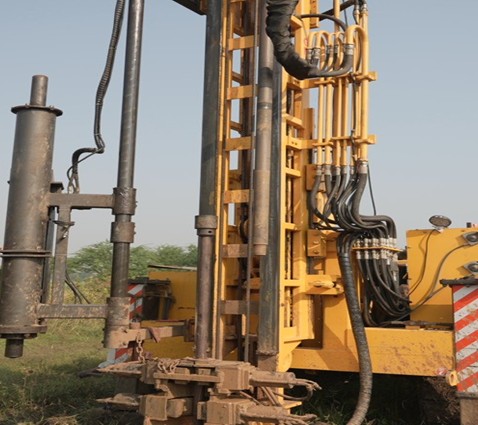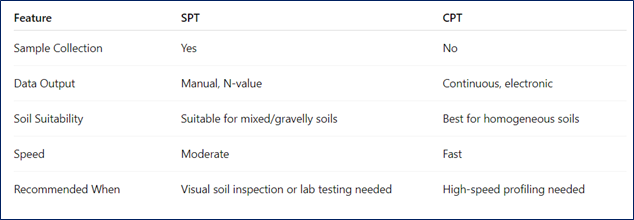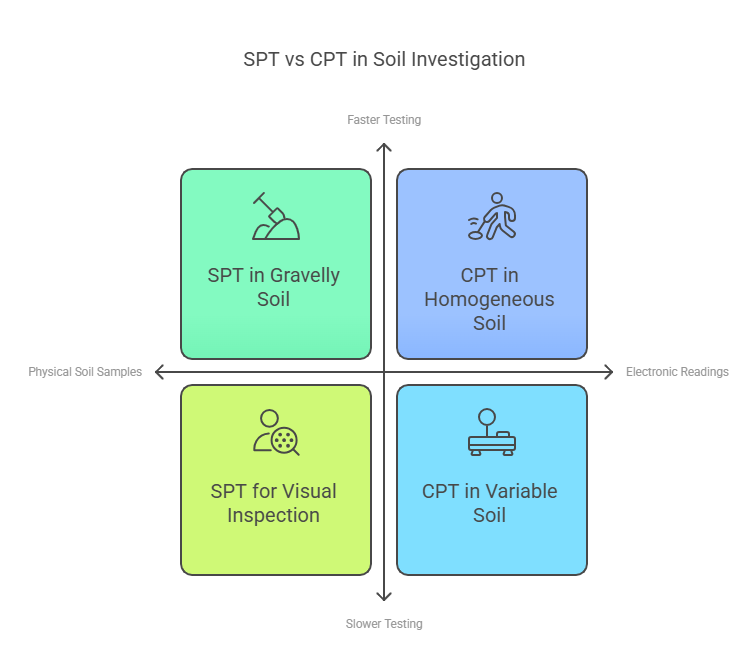- May 7, 2025
- Posted by: daniabasit
- Categories: Geotechnical, Insights

The Standard Penetration Test (SPT) is one of the most widely used field tests in geotechnical engineering worldwide. Developed in the 1920s, this straightforward yet powerful test helps engineers understand what’s happening beneath our feet before the construction phase. Whether you’re building a high-rise in Karachi or assessing foundation conditions in Lahore, SPT provides crucial insights about soil behavior that mark the success of your project.
Standard Penetration Test (SPT) Fundamentals
SPT involves driving a split-barrel sampler into the ground using a 63.5 kg hammer falling from a height of 76 cm. The number of blows required to drive the sampler 30 cm gives us the “N-value” – a simple number that tells us volumes about soil density and strength. SPT is valued for its simplicity, portability, and immediate on-site results. It provides a practical, cost-effective solution for a wide range of geotechnical investigations.
SPT Applications at Velosi Integrity Pakistan
At Velosi Integrity & Safety Pakistan, we use SPT extensively for:
- Foundation design tailored to local soil behavior
- Ground condition assessments for infrastructure projects
- Soil classification and stratigraphy mapping
- Laboratory analysis through physical soil samples
Our experienced geotechnical engineers analyze SPT data to help clients avoid both overdesign and underdesign, ensuring safety and cost-efficiency.
Velosi’s Approach to SPT-Based Soil Investigation
We go beyond routine testing. Our methodology involves:
- Selecting drilling methods based on site-specific conditions
- Minimizing soil disturbance during sampling
- Following strict sample handling protocols to maintain quality for lab testing
This thorough approach allows us to generate reliable soil profiles, giving our clients full confidence in their design and construction decisions.
While both SPT and CPT (Cone Penetration Testing) are valuable tools, they serve different needs:

At Velosi, we assess your project’s unique requirements and recommend the most suitable technique or a combination of both to ensure accurate results.

Why Clients Choose Velosi’s SPT Services
Expert Interpretation: Local soil behavior varies widely, and our experienced engineers are trained to read between the lines of N-values.
- Real Samples: Unlike fully electronic methods, SPT yields physical soil samples that aid in visual classification and lab testing.
- Cost-Efficiency: Our optimized approach is tailored to Pakistan’s diverse terrain and budgets.
- Transparency: We communicate the test’s limitations, especially in soft soils or below water tables, and apply expert judgment accordingly.
Technological Advancements at Velosi
To ensure consistent and high-quality results, Velosi uses:
- Automated SPT Hammers for uniform energy transfer
- Digital Data Collection tools that allow instant reporting and faster decision-making
- Real-Time Communication with engineering teams for quicker analysis
We combine the reliability of traditional methods with modern efficiency to deliver best-in-class geotechnical testing.
Best Practices in the Field
At Velosi Integrity Pakistan, quality control is embedded in our process:
- Pre-test Checks: Equipment calibration and readiness verification
- Standardized Procedures: Adherence to international testing standards
- Detailed Documentation: Includes borehole logs, photos, and GPS-tagged data for every test location
This ensures accuracy, traceability, and credibility of results even under the most demanding project requirements.
Conclusion
The Standard Penetration Test remains a trusted foundation of geotechnical engineering. At Velosi Integrity & Safety Pakistan, we combine proven methods with local expertise and advanced tools to deliver dependable soil investigation services. Whether you’re building vertically or laying infrastructure, our SPT services ensure you build on solid ground.
Please contact us for more information and assistance.



